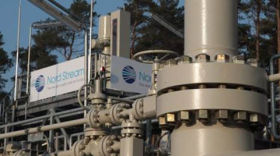Construction, Energy, EU – CIS, Gas, Gas Market , Markets and Companies, Russia, Society, Transport
International Internet Magazine. Baltic States news & analytics
Thursday, 25.04.2024, 12:25
Czech Republic’s delicate Nord Stream 2 dance
 Print version
Print version |
|---|
Gazprom hopes to gain greater access to European markets in
the long run, which will see the Czech Republic receiving a significant
increase in profits from the transit of gas through its territory.
The Czech Republic’s importance as a transit country is set
to rise even more if the second Nord Stream is built. The contentious
Russia-backed project, criticised by the European Parliament and some European
commissioners, aims to deliver 55 bln cubic metres per year of Russian gas to
Germany via the Baltic Sea, cutting out traditional transit states such as
Ukraine and Poland.
Although the Czech government tends to view Nord Stream from
a commercial perspective, the project also presents geopolitical challenges.
This puts the Czech Republic in a difficult position.
On the one hand, both pipelines bring or will bring
increased revenue and help boost ties with Germany, but on the other, an
overtly welcoming stance may alienate the Czech Republic’s Visegrad partners,
especially eastern neighbour and traditional ally Slovakia.
Nord Stream 2 would cost Slovakia about €800 million ($870
million) per year in gas transit revenue, according to government estimates. That is why Slovakia –
along with other Central European countries, including Poland and the Baltic
states – continues to rail against the project. They are also protesting
against the recent decision by the European Commission regarding OPAL.
Czech decision-makers are therefore trying to play the
situation both ways, Adéla Denková,
energy expert and editor-in-chief of EurActiv.cz, told Interfax Natual Gas Daily. "They
try to be outspoken neither about the exemption of OPAL nor Nord Stream 2. The
official position can be summarised like this: the capacity of Nord Stream
could be doubled, but it should be also guaranteed that significant volume of
gas is available from Ukrainian direction."
The mixed Slovak-Czech ownership of Slovak transmission
system operator (TSO) Eustream makes the Czechs’ situation even more
complicated.
Energetický a
prumyslový holding (EPH), owned by Czech entrepreneur Daniel Kretínský, holds a 49% stake in Eustream. The rest remains in the hands of the Slovak
state. Muddying the water further is Mirek
Topolánek, former Czech prime minister, who is among EPH’s top lobbyists
against Nord Stream 2.
"Slovak-Czech relations are not bad, but not perfect,
especially between individual actors, such as TSOs. There are good personal channels,
they respect one another, but their positions are substantially different
now," Jan Osicka, an expert at
the Center for Energy Studies at the Masaryk University in Brno, told Interfax Natural Gas Daily.
Low-key player
The Czech Republic chose not to join other countries in the
region last year in protesting against Nord Stream 2 to the European
Commission. According to sources close to the situation, it was the result of a
disagreement between the more economically oriented position of the Ministry of
Trade and Industry – supported by Deputy Prime Minister Andrej Babiš, the country’s top oligarch – and Czech Prime Minister
Bohuslav Sobotka, who opted for
sticking with Visegrad partners.
A compromise was eventually reached, with Sobotka signing a
milder version of the letter three months later.
For the time being Czech politicians have adopted a
wait-and-see strategy. This seems reasonable, given that the 15% share gas has
in the country’s total primary energy supply is less than half that of Hungary’s;
the country has a higher storage capacity (nine underground storage tanks with
a total capacity of 2.9 bln cubic metres to cover 37% of its annual gas
consumption) than Poland; and, in comparison with Slovakia, the Czech Republic
has diversified imports.
The Czech Republic’s primary supplier is Russia, which
provides around three-quarters of its gas needs, but the rest comes from a
consortium of Norwegian producers and the German gas exchange.
"That is why the Nord Stream 2 is not a burning issue.
If the pipeline is not built, we will still keep the two supply routes, via
Ukraine and Nord Stream 1, which now will be even more sufficient. But, of
course, money is important. The more [that] gas goes via Germany, the more
decent revenues are to be brought to the country," said Osicka.








 «The Baltic Course» Is Sold and Stays in Business!
«The Baltic Course» Is Sold and Stays in Business!

